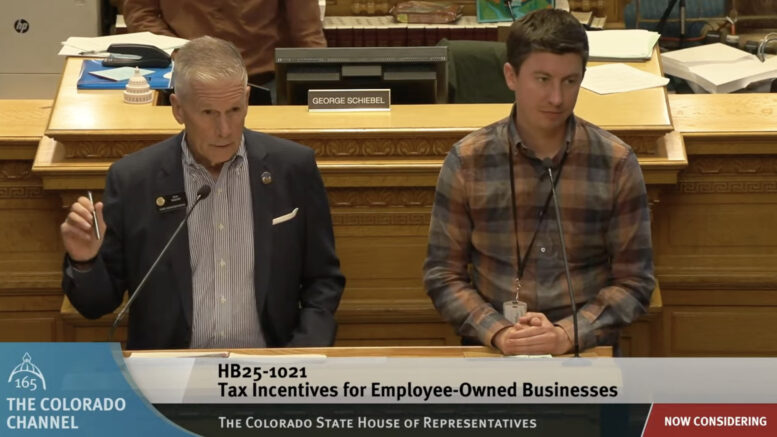Despite a budget deficit that nixed most other bills that reduced money to the state government, renewals and expansions of two existing tax credits appear that they will land on Gov. Jared Polis’ desk and get signed into law.
House Bill 1021 would extend tax credits for companies converting to an employee-ownership model and would add two new tax deductions associated with the practice. And HB 1157 would extend by five years a soon-to-expire tax credit for investors in seven designated advanced industries and expand its availability to individuals who own just 30% the investing companies rather than the current bar of 50%.
Neither bill is a seismic economic-development windfall, but the fact both are advancing during a time of budget austerity — each is expected to get final approval from the Senate on Monday — testifies to the support for the specific types of businesses that will benefit. Colorado, for example, is one of just three states with an office dedicated to growing the numbers of employee-owned companies, and the advanced-industry tax credit has grown since its 2014 approval without shrinking back to original levels.
“We’ve got to tighten our belts. It’s one of those years when we’re focused on the basics,” state Rep. William Lindstedt, the Broomfield Democrat cosponsoring both bills, told the Colorado Chamber of Commerce Tax Council earlier this session. “Colorado has been a good place to do business. But I hope we can do better in the future.”

Colorado state Rep. William Lindstedt speaks to the Colorado Chamber of Commerce Tax Council on Feb. 7.
Advanced industry tax credits
Through the advanced-industries tax credit, investors can keep 25% of what they put into Colorado companies in the advanced manufacturing, aerospace, bioscience, electronics, energy/natural resources, information technology and infrastructure engineering sectors. They must invest at least $10,000, with the maximum annual credit they can receive being $50,000, and the companies getting the money must have generated less than $10 million in investments so far and been generating revenue for less than five years.
The state originally placed a cap of $750,000 a year on such credits but expanded that to $4 million in 2023 after the program had been oversubscribed for multiple years. However, to extend the program from 2026 to 2031 in this tight budget, sponsors reduced the annual allocation for those years to $2.5 million and yanked from HB 1157 a provision that would have added to the list of eligible sectors any manufacturing that proved to be scalable.
Still, keeping the program in place is a huge win, as it’s proven to be a tipping point for investors to decide to put their money into certain companies, officials said.
A full 80% of AITC investors told the state in surveys that they wouldn’t have directed their money as they did without the tax credit, program analyst Luz Gonzalez told the Senate Finance Committee on Thursday. And Elizabeth Philbrick, president/CEO at EsoTerra Ciderworks in Durango, said all but one of the investors in a recent $795,000 fundraising round that allowed the cidery to buy 70 acres of new land used the credit.
“I can honestly say that without this credit, I couldn’t foresee how we could have raised this money,” Philbrick said.
Employee-ownership tax breaks
Meanwhile, the employee-ownership tax credit, which began as a passion project for Polis, is catching on and getting more long-time business owners to sell their companies to their workers rather than to out-of-state conglomerates, backers said.
The existing tax credit lets owners retain 50% of the costs of conversion of a business to a employee stock ownership plan or a worker-owned cooperative — a key provision because the technical and legal costs of a conversion can be off-puttingly high, Lindstedt said. The value of credits claimed has quadrupled from $403,750 in fiscal year 2021-22, the program’s first year, to $1.6 million in fiscal year 2023-24.
HB 1021 extends the tax credit through 2031 and grows the annual cap to $3 million, and it allows new tax deductions for the business owners and for worker-owned cooperatives involved in these transactions. Plus, it adds a tax credit for the nonprofits and businesses that help the companies to convert, and it increases to 75% the portion of expenses that owners can keep via the credit.
Why employee ownership matters
Michael Gifford, policy director for the Associated General Contractors of Colorado, said he can point to at least 10 construction companies that have become employee-owned in part because of the existence of the tax break. Tristan Watkins, deputy director of the Colorado Office of Economic Development and International Trade business support division, said that with 68% of company owners reporting via surveys that they have no succession plans, the program should grow significantly in importance.
“I think as an entrepreneur, if we can leave a legacy of the company to the people who helped to build it, that is an incredible opportunity,” said cosponsoring Rep. Rick Taggart, a retired Grand Junction businessman.
HB 1021 passed the House by a vote of 56-8. HB 1157 cleared it on a 57-8 margin.
Tax-break rollback drawing opposition
Meanwhile, even though sponsors gutted HB 1296 — a bill that sought to roll back tax breaks on the insurance sector, software sales and some enterprise-zone investors — House Republicans and some industry groups continue to fight it. The bill continues to claw back about $26 million annually for the state by doing things like nixing tax credits for companies selling fuel or building telecommunications infrastructure inside enterprise zones and by capping lifetime enterprise-zone investment tax credits at $2 million.
Opponents such as Taggart said the $2 million cap, which can still be appealed to state economic-development leaders on a case-by-case basis, specifically will hurt rural areas and needs to be reconsidered. Telecommunications leaders also argue that nixing tax breaks they can get for building in economically stunted areas without optimal services runs counter to Polis’ efforts to expand communications throughout the state.
That bill passed lost several Democrats in passing the House by a margin of 39-25 on April 28, and it got a “no” vote from Democratic Sen. Marc Snyder of Manitou Springs while advancing out of Senate Finance by a 5-3 tally on Thursday. Still, it seems likely that it could receive its final approval from the Senate as early as Monday morning.
